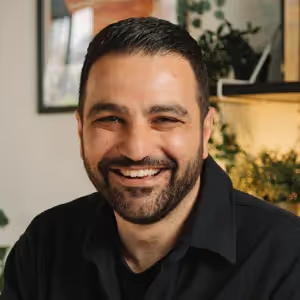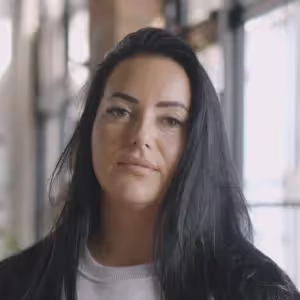Nader's story: Why he founded Gaia

I remember the day when my wife and I went from not trying to conceive, to trying to conceive. You sort of immediately start expecting something without expecting anything.
But after a while, you realize that it’s obviously not working the way you had imagined. And you start thinking about having a child more than you had ever done before.
After nine or ten months of trying to conceive "naturally," we saw a gynecologist who my wife knew. It was a month or two later, after completing a series of fertility tests, when I started researching IVF treatment.
Fast-forward three years: What we thought would be a straightforward experience was far from it. After five rounds of IVF treatment across multiple clinics and countries, we were fortunate enough to have a child.
But it was painful. Physically painful for my wife. The weight of the physical experience falls disproportionately on the woman, because the woman today is always considered "the patient," and that really doesn't happen if you’re receiving any other kind of medical treatment. But from my experience, a man's participation in the process can be pretty passive.
However, the experience was emotionally painful for both of us. As a partner, you have the emotional pain from your own experience, but also from watching someone you love and care deeply about going through the treatment. You essentially have to take a backseat and cheer from the sidelines.
Another thing that made it hard was that we never understood why it wasn’t working for us. We were one of the many “unexplained'' cases of infertility. As someone who loves working with numbers and solving problems, there was no solution. No number, no answer.
For each round of IVF we started, the only thing we had was hope. After our second round was unsuccessful and we decided to try again a third time, I remember thinking “this has really got to work”. But it didn’t. You end up playing an emotional lottery based on inflated expectations – throwing money, chasing hope. It wasn’t enough. I wanted to understand the risk that we, and so many IVF patients like us, were taking. I wanted to understand why we weren’t successful and what our chances would be going forward.
Then, there was the financial pain. If we were going to invest tens of thousands of dollars into this process, I wanted to ensure that we were making the right decision. But we never had that. We were never given a roadmap, or a total sum of money that we might have to spend. It frustrated me – and that frustration ultimately turned into a determination to do something about it.
Why I founded Gaia
The difference between having a child or not shouldn’t be how rich you are – and the system today is designed exactly like that. Most people don’t have $50,000 stashed away to pay for IVF treatment.
But a lot of people can manage affordable monthly payments with a sensible back-up plan to limit their cost.
I founded Gaia because I wanted to ensure that fertility wouldn't be treated as a luxury good, but an accessible right of common healthcare. And no one should have to pay for IVF treatment without a child to show for it.
IVF insurance is only the beginning for Gaia. When my son grows up, I want to be able to tell him that Gaia came as a reaction to a problem that we encountered when we were bringing him to life. And that thanks to him, a whole new generation of family makers could exist. He was the spark that made this possible. Today, we’re starting that journey with IVF insurance. And I can’t wait to share where we’re going next.




